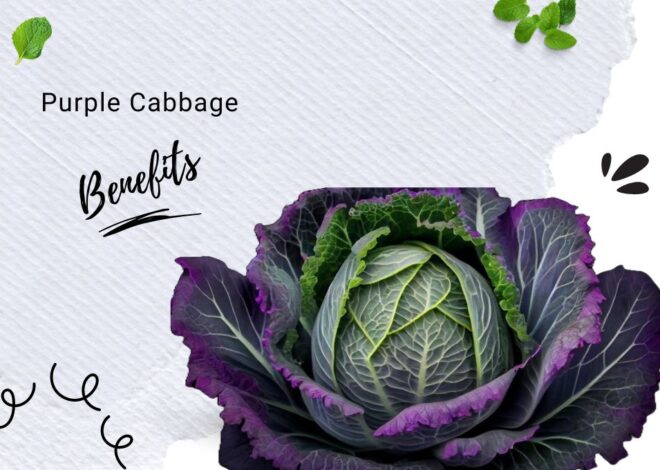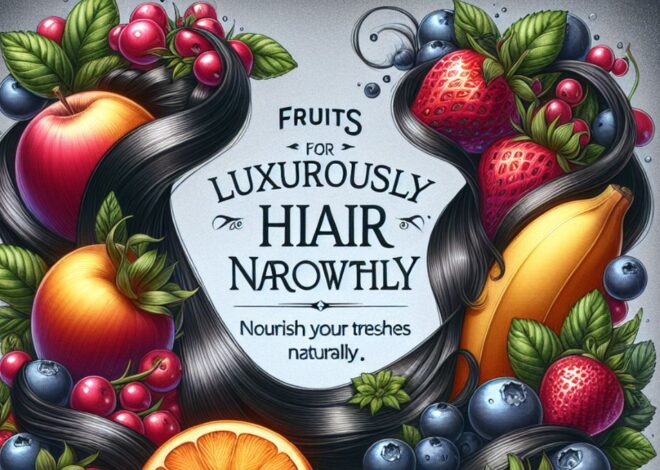
From Thin to Thick: Harness the Power of Healthy Nuts for Hair Growth!
Healthy Nuts for Hair Growth Welcome to our comprehensive guide on how healthy nuts can transform your hair from thin and lacklustre to thick and vibrant! Hair loss and thinning are common concerns for many individuals, and finding natural solutions is key to maintaining a healthy mane. In this blog post, we will explore the powerful benefits of various nuts and how they can promote hair growth. So, grab a handful of your favourite nuts and let’s dive into this nutty journey towards luscious locks!

Hair loss is a common concern that affects both men and women. It can be caused by various factors, including genetics, hormonal changes, medical conditions, and lifestyle choices. While there are several treatments available to address hair loss, understanding the underlying causes is essential for effective management. In this section, we will explore the primary causes of hair loss and delve into the role of nutrition in promoting healthy hair growth.
Causes of Hair Loss-:
Genetic Factors: One of the most common causes of hair loss is hereditary pattern baldness, also known as androgenetic alopecia. This condition is influenced by genes inherited from both parents and can lead to gradual hair thinning and eventual baldness.
Hormonal Changes: Hormonal imbalances can contribute to hair loss. For instance, hormonal fluctuations during pregnancy and childbirth can cause temporary hair shedding, known as postpartum hair loss. Hormonal disorders such as polycystic ovary syndrome (PCOS) and thyroid abnormalities can also impact hair growth.
Medical Conditions: Certain medical conditions can trigger hair loss. These include alopecia areata, an autoimmune disorder that causes patchy hair loss; scalp infections like ringworm; and chronic illnesses such as lupus and diabetes.
Nutritional Deficiencies: Inadequate nutrition can have a significant impact on hair health. Deficiencies in essential nutrients like iron, zinc, biotin, vitamins (especially B vitamins), and protein can lead to weakened hair follicles, increased hair shedding, and slower hair growth.
Stress and Trauma: Physical or emotional stress, trauma, and extreme weight loss can induce a condition called telogen effluvium. This condition causes a significant number of hair follicles to enter the resting phase, leading to excessive hair shedding.
The Role of Nutrition in Hair Growth-:
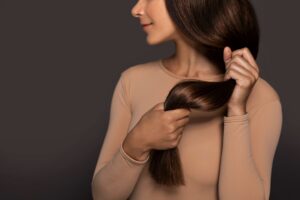
Proper nutrition plays a vital role in maintaining healthy hair growth. Nutrients provide the building blocks for hair follicles, ensuring they function optimally. Here are some key nutrients that contribute to healthy hair growth:
Protein: Hair is primarily composed of a protein called keratin. Adequate protein intake from sources like lean meats, fish, eggs, legumes, and dairy products supports hair strength and growth.
Iron: Iron deficiency is a common cause of hair loss, particularly in women. Iron-rich foods like red meat, spinach, lentils, and fortified cereals can help prevent iron deficiency anaemia and promote healthy hair growth.
Biotin: Also known as vitamin B7, biotin is essential for hair health. It aids in the production of keratin and supports the growth of strong, thick hair. Foods rich in biotin include nuts, eggs, whole grains, and bananas.
Vitamins and Antioxidants: Vitamins, particularly B vitamins (such as Biotin, B12, and B6), vitamin C, and vitamin E, are crucial for maintaining healthy hair growth. They support scalp health, promote circulation, and protect hair follicles from damage. Fruits, vegetables, nuts, and seeds are excellent sources of these vitamins and antioxidants.
Omega-3 Fatty Acids: Found in fatty fish (salmon, mackerel), flaxseeds, chia seeds, and walnuts, omega-3 fatty acids help nourish hair follicles, reduce inflammation, and improve overall hair health.
Zinc: Zinc deficiency has been associated with hair loss. Foods rich in zinc, such as oysters, beef, pumpkin seeds, and lentils, can help maintain healthy hair growth.
Why Nuts?
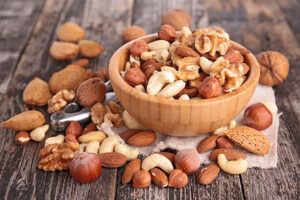
Nuts are a powerhouse of nutrients and have gained recognition for their numerous health benefits. When it comes to hair health, nuts offer a unique combination of essential vitamins, minerals, healthy fats, and antioxidants that contribute to strong, vibrant hair. Let’s explore the nutrient profile of nuts and discover the incredible benefits they provide for promoting healthy hair.
Nutrient Profile of Nuts
Nuts boast an impressive array of nutrients that support overall well-being, including hair health. Here are some key nutrients found in various nuts:
Vitamin E: Vitamin E is an antioxidant that helps protect hair follicles from oxidative stress. It promotes blood circulation to the scalp and enhances hair growth. Almonds, sunflower seeds, and hazelnuts are rich sources of vitamin E.
Omega-3 Fatty Acids: These healthy fats nourish hair follicles, reduce inflammation in the scalp, and enhance hair strength and thickness. Walnuts and flaxseeds are excellent sources of omega-3 fatty acids.
Selenium: Selenium is a mineral that plays a crucial role in maintaining scalp health and promoting hair growth. Brazil nuts are an exceptional source of selenium.
Zinc: Zinc deficiency has been linked to hair loss, making it essential for healthy hair growth. Cashews, almonds, and pumpkin seeds are all rich in zinc.
Biotin: Biotin, also known as vitamin B7, is vital for hair growth and strength. It helps in the production of keratin, the protein that makes up hair strands. Nuts like almonds, walnuts, and pecans contain biotin.
Protein: Protein is the building block of hair, and nuts provide a plant-based source of this essential nutrient. Almonds, cashews, and pistachios are good sources of protein.
Benefits of Nuts for Hair Health-:
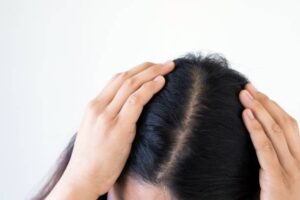
Including nuts in your diet can have several beneficial effects on your hair. Let’s explore the key benefits:
Promotes Hair Growth: The rich nutrient profile of nuts supports healthy hair growth. Nutrients like biotin, protein, and omega-3 fatty acids nourish hair follicles, strengthen the hair shaft, and stimulate new hair growth.
Strengthens Hair: Nuts are packed with minerals like zinc and selenium, which help strengthen hair strands from within. This can reduce hair breakage and enhance hair resilience.
Improves Scalp Health: Nuts contain vitamin E, antioxidants, and healthy fats that nourish the scalp, improve blood circulation, and combat dryness and itchiness. A healthy scalp creates an optimal environment for hair growth.
Adds Shine and Luster: The natural oils and fats present in nuts help moisturize the hair, adding shine and lustre. This can improve the overall appearance and texture of the hair.
Reduces Hair Loss: Nutrients like biotin, zinc, and vitamin E found in nuts can help reduce hair loss and thinning. They support the health of hair follicles, minimize scalp inflammation, and prevent oxidative damage.
Protects Hair from Damage: The antioxidants present in nuts, such as vitamin E, protect hair follicles and strands from damage caused by free radicals and environmental factors. This can help maintain the integrity and strength of the hair.
Enhances Hair Texture: The combination of protein, healthy fats, and minerals in nuts can improve the texture and thickness of the hair. It can make the hair more manageable, voluminous, and less prone to frizz.
The Top Nuts for Hair Growth-:
When it comes to promoting hair growth and maintaining healthy hair, incorporating a variety of nuts into your diet can be incredibly beneficial. Each type of nut offers unique properties that support different aspects of hair health. Let’s explore the top nuts known for their remarkable contributions to hair growth.
Almonds: Nature’s Vitamin E Boost
Almonds are packed with vitamin E, a potent antioxidant that helps protect hair follicles from oxidative stress. This vitamin promotes blood circulation to the scalp, ensuring a well-nourished environment for healthy hair growth. Additionally, almonds contain biotin, which plays a crucial role in strengthening hair strands and enhancing hair thickness. Snack on a handful of almonds daily or sprinkle chopped almonds over your salads or oatmeal to harness their hair-boosting benefits.
Walnuts: Omega-3 Fatty Acids for Hair Strength
Walnuts are an excellent source of omega-3 fatty acids, which are essential for nourishing hair follicles and promoting hair strength. These healthy fats help prevent scalp inflammation, maintain hair moisture, and reduce hair breakage. Walnuts also contain biotin, which supports hair growth and overall hair health. Incorporate walnuts into your diet by enjoying them as a snack or adding them to baked goods, cereals, or salads for a crunchy and nutritious boost.
Brazil Nuts: Selenium for Scalp Health
Brazil nuts are known for their high selenium content, a mineral that plays a vital role in maintaining scalp health. Selenium helps prevent dandruff, supports the production of antioxidants, and regulates the function of the thyroid gland, which is crucial for healthy hair growth. These delicious nuts are also rich in zinc and vitamin E, further promoting strong and vibrant hair. Consume a few Brazil nuts per day to provide your body with this essential mineral and reap its hair-nourishing benefits.
Cashews: Zinc for Hair Growth
Cashews are a fantastic source of zinc, a mineral that supports hair growth and helps prevent hair loss. Zinc plays a crucial role in maintaining a healthy scalp and regulating hormone levels, both of which are essential for optimal hair health. Additionally, cashews provide an abundance of protein, biotin, and vitamin E, all of which contribute to strong, lustrous hair. Enjoy cashews as a standalone snack or incorporate them into your favourite recipes to harness their hair growth-promoting properties.
Pistachios: Biotin for Hair Thickness
Pistachios are not only delicious but also a great source of biotin, a B vitamin essential for hair thickness and strength. Biotin helps in the production of keratin, the protein that forms the structure of hair strands. Including pistachios in your diet can improve hair texture, reduce brittleness, and promote overall hair health. Snack on a handful of pistachios or add them to your salads, smoothies, or desserts for a tasty and hair-nourishing treat.
Macadamia Nuts: Moisture and Shine
Macadamia nuts are rich in monounsaturated fats, which provide intense moisture and nourishment to the hair. These healthy fats help hydrate the hair strands, reduce frizz, and add a natural shine. Macadamia nuts also contain vitamin E and antioxidants, offering additional protection against hair damage and promoting scalp health. Incorporate macadamia nuts into your diet or use macadamia nut oil as a hair treatment to enjoy their moisturizing and shine-enhancing benefits.
Pecans: Antioxidants for Hair Protection
Pecans are loaded with antioxidants, including vitamin E and ellagic acid, which help protect hair follicles and strands from oxidative damage. These antioxidants combat free radicals, environmental stressors, and UV radiation, which can lead to hair breakage, dullness, and premature ageing. Pecans also provide essential minerals like zinc and biotin, contributing to healthy hair growth and thickness. Enjoy pecans as a snack or incorporate them into your baking and cooking to promote hair protection and overall hair health.
Hazelnuts: Vitamin E and B Vitamins for Hair Health
Hazelnuts are rich in vitamin E, an antioxidant that promotes blood circulation to the scalp and supports hair growth. Vitamin E also helps in the absorption of other nutrients necessary for healthy hair, such as vitamin C and iron. Hazelnuts also contain B vitamins, including biotin and folate, which play a crucial role in maintaining healthy hair and preventing hair loss. Enjoy hazelnuts on their own, or incorporate them into your recipes to reap their hair-nourishing benefits.
Pumpkin Seeds: Essential Nutrients for Hair Growth
Pumpkin seeds are a nutritional powerhouse, providing a wide range of nutrients that support hair growth. They are an excellent source of zinc, which promotes hair growth and prevents hair loss. Pumpkin seeds also contain iron, magnesium, and vitamin K, all of which contribute to healthy hair follicles and improve scalp health. Additionally, these seeds are rich in omega-3 fatty acids, protein, and antioxidants, providing comprehensive nourishment to the hair and scalp. Snack on pumpkin seeds or sprinkle them over salads, soups, or yoghurt for a nutrient-dense boost to your hair growth journey.
Adding nuts to your regular diet is a simple and delicious way to promote hair growth and enjoy their numerous health benefits. Here are some tips for incorporating nuts into your daily routine:
Snack on a Handful: Keep a variety of nuts, such as almonds, walnuts, or cashews, in portioned containers or resealable bags. Grab a handful of nuts as a convenient and nutritious snack on the go.
Sprinkle on Salads and Yogurt: Add a crunch to your salads or yoghurt by sprinkling chopped nuts, such as pecans or pistachios, on top. Not only will this enhance the texture and flavour, but it will also provide a nutrient boost.
Include in Breakfast: Add nuts to your breakfast routine. You can sprinkle them over oatmeal or cereal, blend them into smoothies, or mix them into pancake or waffle batter for added nutritional value.
Use as Toppings: Enhance the taste and nutritional profile of your dishes by using nuts as toppings. Whether it’s sprinkling crushed almonds over roasted vegetables or garnishing your favourite pasta dish with pine nuts, the options are endless.
Bake with Nuts: Incorporate nuts into your baking recipes. Whether you’re making cookies, bread, or muffins, adding chopped nuts like walnuts or hazelnuts can provide texture, flavour, and a nutrient boost.
Whole Nuts vs. Nut Butter: Which is Better?
Both whole nuts and nut butter offer benefits, but it ultimately depends on your personal preference and dietary needs. Let’s compare the two options:
Whole Nuts: Whole nuts provide a satisfying crunch and are a great source of fibre, healthy fats, and protein. They offer a more substantial chewing experience and can help control portion sizes. Whole nuts are also versatile and can be enjoyed on their own or incorporated into various dishes.
Nut Butter: Nut butter, such as almond butter or peanut butter, offers a creamy and spreadable texture. Nut butter is convenient and can be easily incorporated into recipes, added to smoothies, or used as a topping. It provides similar nutritional benefits as whole nuts, including healthy fats and protein.
When choosing between whole nuts and nut butter, consider the following factors:
Texture Preference: If you enjoy the crunch and texture of whole nuts, opt for them. If you prefer a smoother and more spreadable option, nut butter is a good choice.
Portion Control: Whole nuts can help with portion control as you can physically see how much you’re consuming. Nut butter, on the other hand, can be easier to overconsume if not measured properly.
Dietary Restrictions: Some individuals may have allergies or sensitivities to certain nuts. Nut butter made from alternative options like sunflower seeds or tahini can be suitable alternatives.
In the end, it’s beneficial to incorporate both whole nuts and nut butter into your diet for variety and a range of nutrients.
Snack Ideas with Nuts
Snacking on nuts can be a satisfying and nutritious way to curb hunger between meals. Here are some creative snack ideas to enjoy the goodness of nuts:
Trail Mix: Create your custom trail mix by combining different nuts like almonds, cashews, and walnuts with dried fruits, seeds, and a sprinkle of dark chocolate for a sweet and savoury snack.
Nut Butter Dippers: Pair your favourite nut butter, such as almond or peanut butter, with apple slices, carrot sticks, or celery for a nutritious and satisfying snack. You can also spread nut butter on whole-grain crackers or rice cakes.
Energy Balls: Make homemade energy balls by blending nuts, dates, and other ingredients like cocoa powder or coconut flakes. Roll the mixture into bite-sized balls and refrigerate for a convenient and energizing snack.
Nutty Yogurt Parfait: Layer Greek yoghurt with chopped nuts, fresh berries, and a drizzle of honey for a protein-packed and nutrient-rich snack.
Nutty Smoothies: Add a handful of nuts, such as almonds or walnuts, to your favourite smoothie recipe for an extra boost of protein, healthy fats, and fibre.
Nutty Granola Bars: Make your granola bars using a combination of nuts, seeds, oats, and natural sweeteners like honey or maple syrup. These homemade bars are a great on-the-go snack.
Nutty Recipes for Hair Growth
Incorporating nuts into your recipes can elevate their nutritional value while promoting hair growth. Here are some delicious and hair-healthy recipes:
Almond-Crusted Baked Chicken: Crush almonds and use them as a coating for baked chicken breasts. The almonds add a satisfying crunch and provide vitamin E and protein to support hair health.
Walnut and Spinach Salad: Toss fresh spinach leaves with chopped walnuts, dried cranberries, and crumbled feta cheese. Drizzle with a balsamic vinaigrette for a nutritious and flavorful salad packed with omega-3 fatty acids.
Brazil Nut Pesto Pasta: Blend Brazil nuts, basil, garlic, olive oil, and Parmesan cheese to create a delicious and nutrient-rich pesto sauce. Toss the sauce with your favourite pasta for a satisfying meal.
Cashew Stir-Fry:

Sauté cashews with a medley of colourful vegetables like bell peppers, broccoli, and snap peas. Add a protein source of your choice, such as tofu or shrimp, and season with soy sauce or your preferred stir-fry sauce.
Pistachio and Avocado Toast: Mash avocado onto whole grain toast and sprinkle with chopped pistachios. This combination provides healthy fats, fibre, and a delightful crunch.
Nutty Overnight Oats: Prepare overnight oats by combining rolled oats, your choice of milk, a dollop of nut butter, and a handful of chopped nuts like almonds or pecans. Let it sit overnight in the refrigerator, and enjoy a quick and nutritious breakfast in the morning.
Fruits for Hair Growth-:
Fruits are packed with vitamins, minerals, and antioxidants that nourish the hair follicles and promote healthy hair growth. Here are a few fruits to include in your diet:
Berries: Blueberries, strawberries, and raspberries are rich in antioxidants that protect hair follicles from damage.
Citrus Fruits: Oranges, lemons, and grapefruits are excellent sources of vitamin C, which aids in collagen production and promotes hair strength.
Avocado: Avocado is not only a healthy fat source but also contains vitamin E, which helps improve scalp circulation and promotes hair growth.
Kiwi: Kiwi is loaded with vitamin C, vitamin E, and antioxidants that contribute to collagen synthesis and hair health.
Vegetables for Stronger Hair:
Vegetables provide essential nutrients that support hair strength and vitality. Here are some hair-boosting vegetables to include in your meals:
Spinach: Spinach is rich in iron, folate, and vitamins A and C, which help in the production of sebum, a natural hair conditioner.
Sweet Potatoes: Sweet potatoes are packed with beta-carotene, which the body converts into vitamin A. Vitamin A promotes the growth of healthy cells, including hair cells.
Bell Peppers: Bell peppers contain vitamin C and antioxidants that strengthen hair follicles and promote collagen production.
Broccoli: Broccoli is a great source of vitamins A and C, as well as folate and calcium, all of which contribute to healthy hair growth.
Proteins for Hair Health:
Protein is a vital nutrient for hair growth as hair strands are composed primarily of a protein called keratin. Including protein-rich foods in your diet can help promote stronger and healthier hair. Here are some protein sources to consider:
Eggs: Eggs are a complete protein source, providing essential amino acids necessary for hair growth. They are also rich in biotin and vitamins D and B12, which promote hair strength and growth.
Lean Meats: Chicken, turkey, and lean cuts of beef are excellent sources of high-quality protein, iron, and zinc, all of which are crucial for healthy hair growth.
Fish: Fatty fish like salmon, mackerel, and sardines are rich in omega-3 fatty acids, which nourish the scalp and support hair growth.
Legumes: Lentils, chickpeas, and beans are plant-based protein sources that also provide iron, zinc, and biotin, supporting hair health.
Hydration: The Key to Healthy Hair:
Proper hydration is essential for maintaining healthy hair. When the body is dehydrated, it affects the health of hair follicles and can lead to dry and brittle hair. Make sure to drink an adequate amount of water throughout the day to keep your hair hydrated and healthy.
Additionally, herbal teas and coconut water can provide hydration while offering additional hair benefits. Herbal teas like green tea or chamomile tea contain antioxidants that promote scalp health, while coconut water provides electrolytes and nutrients that nourish the hair.
Stress Reduction and Hair Loss Prevention:
Excessive stress can contribute to hair loss and disrupt the natural hair growth cycle. Practising stress reduction techniques can help promote a healthy environment for hair growth. Consider incorporating the following practices into your routine:
- Relaxation Techniques: Engage in activities like meditation, deep breathing exercises, or yoga to reduce stress levels and promote relaxation.
- Adequate Sleep: Ensure you are getting enough quality sleep each night. Lack of sleep can lead to increased stress levels and hair loss.
- Time for Self-Care: Set aside time for activities that bring you joy and help you unwind, such as reading, taking baths, or pursuing hobbies. Taking care of your overall well-being can positively impact hair health.
Regular Exercise and Blood Circulation:

Regular physical exercise not only benefits your overall health but also supports optimal blood circulation, including to the scalp. Improved blood circulation to the hair follicles ensures they receive a sufficient supply of nutrients and oxygen for healthy hair growth. Incorporate exercises like cardio, yoga, or brisk walking into your routine to enhance blood flow to the scalp.
Proper Hair Care Routine:
Maintaining a consistent and appropriate hair care routine is essential for promoting hair growth and preventing damage. Consider the following tips:
- Gentle Washing: Use a mild shampoo and conditioner to avoid stripping the hair of its natural oils. Gently massage the scalp while washing to stimulate blood circulation.
- Scalp Care: Pay attention to your scalp health by keeping it clean and free from excessive oil or product buildup. Regularly exfoliate the scalp to remove dead skin cells and promote a healthy environment for hair growth.
- Conditioning: Apply a nourishing conditioner to the lengths of your hair to keep it moisturized and prevent breakage.
- Avoiding Hot Water: Use lukewarm or cool water for hair washing to prevent drying out the scalp and hair strands.
- Regular Trimming: Schedule regular hair trims every 6 to 8 weeks to prevent split ends and maintain healthy hair.
Avoiding Harmful Styling Practices:
Certain styling practices can contribute to hair damage and breakage. Minimize the use of heat-styling tools like flat irons, curling irons, and blow dryers, as excessive heat can weaken the hair shafts. If using heat styling tools, always apply a heat-protectant product before styling.
Avoid tight hairstyles that pull on the hair, such as tight ponytails, braids, or buns, as they can cause hair breakage and traction alopecia. Opt for looser hairstyles and use hair-friendly accessories like scrunchies or clips.
Additionally, be cautious when using chemical treatments like relaxers or permanent dyes, as they can weaken the hair structure. If possible, choose gentler alternatives or seek professional assistance.


